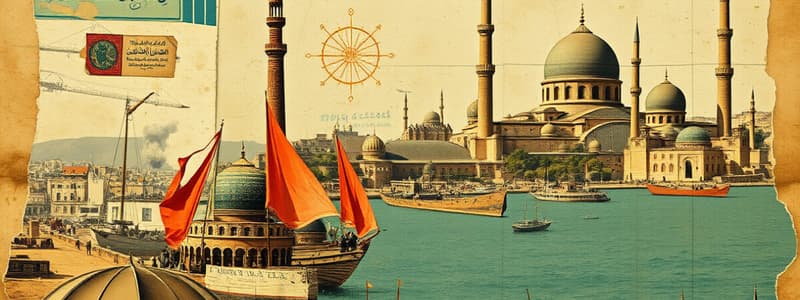Podcast
Questions and Answers
Which of the following best summarizes the map Middle East Trade Routes, 570 CE?
Which of the following best summarizes the map Middle East Trade Routes, 570 CE?
- Islam spread slowly due to isolation.
- Islam was influenced by local customs.
- Islam spread quickly because of trade. (correct)
- Trade routes were irrelevant to its spread.
Which of the following best summarizes the map Military Campaigns 622-750?
Which of the following best summarizes the map Military Campaigns 622-750?
- Military campaigns had no impact on Islamic spread.
- Islam spread quickly because its leaders conquered surrounding territories. (correct)
- Islam was spread through peaceful means only.
- Islam spread slowly due to internal conflicts.
Which of the following best summarizes the Account of the Battle of Hims?
Which of the following best summarizes the Account of the Battle of Hims?
- Islam conquered territories harshly without consideration for local people.
- People resisted the Muslim rule.
- Islam spread quickly because its leaders treated newly conquered people well. (correct)
- Newly conquered people disliked Muslim leadership.
Which of the following best summarizes the Verses from the Qur'an?
Which of the following best summarizes the Verses from the Qur'an?
Which of the following best summarizes The Ordinances of Government?
Which of the following best summarizes The Ordinances of Government?
What is a cultural diffusion 'trigger'?
What is a cultural diffusion 'trigger'?
Study Notes
Trade and Commerce
- Mecca served as a vital trade center before Islam's advent, facilitating rapid dissemination of its messages along established routes.
- Islamic expansion capitalized on existing trade connections, enabling swift communication and conversion among diverse cultures.
Military Conquests
- Following Muhammad's leadership, Islamic forces launched military campaigns from 622 to 750 CE, effectively expanding their territory.
- Conquered regions experienced an influx of Islamic teachings, often through direct interaction with Muslim leaders and soldiers.
Treatment of Conquered Peoples
- Newly conquered populations frequently welcomed Islamic rule, discontented with previous authorities.
- Islamic leaders implemented policies that promoted tolerance and respect for local customs, fostering goodwill among the conquered.
Religious Messages
- The Qur'an conveyed principles rewarding good behavior and emphasizing the sanctity of life and property.
- Positive, inclusive messages within the Qur'an attracted many to convert, seeing Islam as a moral and just faith.
Governance and Order
- Islamic caliphates were characterized by effective governance and social order, reminiscent of modern democratic systems.
- Leaders were expected to administer justice impartially, which contributed to stability and legitimacy of Islamic rule.
Cultural Diffusion
- Cultural diffusion initiated by trade, military campaigns, and governance methods led to a blend of Islamic and local traditions.
- Cultural interaction fostered mutual understanding and integration, further promoting the growth of Islam in various regions.
Studying That Suits You
Use AI to generate personalized quizzes and flashcards to suit your learning preferences.
Description
This quiz explores the intertwining of trade and military conquests during the early expansion of Islam. It highlights how Mecca's trade routes facilitated the spread of Islamic messages, the military strategies employed, and the treatment of conquered peoples. Understand the relevance of trade in Islamic history and its impact on cultural exchange.




